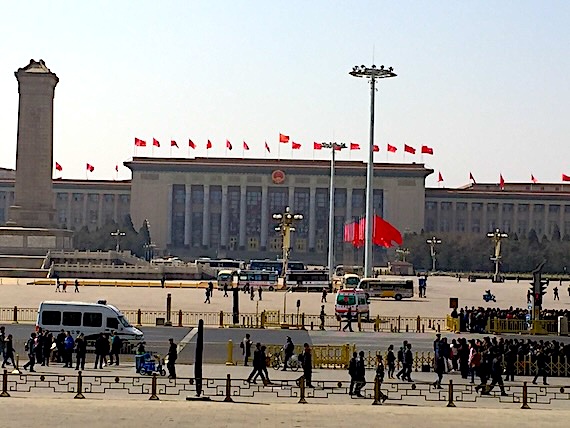By Peiman Salehi | –
( Middle East Monitor ) – The recent Shanghai Cooperation Organization (SCO) summit in Beijing was accompanied by a striking military parade and a series of ambitious economic proposals. Much of the global commentary presented the event as further evidence of a transition from US dominance to a new Chinese century. Yet this framing oversimplifies the reality. What the SCO summit actually reveals is the consolidation of a multipolar world in which no single state will enjoy uncontested primacy. For the Middle East, this shift is not a distant abstraction. It carries profound implications for sovereignty, development, and the struggle to free the region from external domination.
For decades, the Middle East has lived under the shadow of American hegemony. US alliances with Israel and key Persian Gulf monarchies, backed by an extensive military footprint and the weaponization of finance, have shaped the region’s politics. Sanctions against Iran, Syria, and Lebanon have illustrated how Washington’s control over the dollar and international institutions has been used to enforce compliance. At the same time, Western-backed financial institutions such as the IMF and World Bank have imposed conditions that weakened social protections and left many economies dependent and vulnerable. The SCO summit, with its proposals for an SCO Development Bank and the use of local currencies in trade, points to the possibility of alternatives.
This is not to suggest that China or Russia will liberate the Middle East. Both pursue their own interests. China seeks energy security and access to markets, while Russia leverages its military presence in Syria and partnerships with regional actors. But multipolarity changes the equation. It means that US dominance is no longer uncontested, and that Middle Eastern states may find space to diversify their partnerships, reduce dependency on Western-controlled finance, and negotiate from a position of greater autonomy. The challenge is whether regional governments will seize this opportunity or fall into new forms of dependency.
Examples from recent years illustrate both the risks and possibilities. Iran, heavily sanctioned by the United States, has turned toward barter trade and local currency deals with Asian partners, showing that financial innovation can provide breathing space in the face of coercion. Turkey has experimented with currency swaps and regional agreements to stabilize its economy. Gulf states have welcomed Chinese investment and signaled interest in joining non-Western institutions. Yet these moves remain fragmented, and the absence of a coherent regional strategy leaves the Middle East vulnerable to being played off among competing powers.
The SCO’s emphasis on new financial mechanisms resonates strongly in a region where access to credit and development finance has too often been tied to political submission. An SCO Bank, even in embryonic form, would symbolise a world in which nations can borrow without signing away their sovereignty. The broader trend of de-dollarization, already visible in Russia-China and the volatility of US monetary policy. For societies exhausted by cycles of war, austerity, and dependency, these shifts matter.
Yet multipolarity is not a guarantee of justice. A Middle East that passively shifts from reliance on Washington to reliance on Beijing or Moscow will not escape the logic of dependency. True sovereignty requires strategy, coordination, and vision. Regional actors must prioritize social development, resilience, and equitable growth, not merely serve as arenas for external competition. Civil society also has a role in pressing governments to demand fairer terms, greater transparency, and genuine independence in their engagements with non-Western powers. Without this, multipolarity could reproduce familiar hierarchies under new labels.
Philosophically, the SCO summit underscores a broader transformation. As scholars such as Amitav Acharya argue, the future world order will not be defined by a single hegemon but by an “archipelago of powers.” For the Middle East, this archipelago can be an opportunity. It allows the region to escape binary choices and assert its own role. But an archipelago is fragmented; without unity and strategy, the region risks drifting between islands of power without charting its own course. The task for Middle Eastern states is to approach multipolarity not as spectators, but as active participants shaping the new order.

Great Hall of the People, Beijing. © Juan Cole, 2015.
The SCO summit in Beijing will be remembered by some for its missiles and jets. Yet its deeper significance lies in the cracks it revealed in Western hegemony and the possibilities it opened for others. For the Middle East, the lesson is clear: the age of uncontested US primacy is ending, but what replaces it is not predetermined. It could be another cycle of dependency, or it could be a more balanced, just, and multipolar world. The difference will depend on whether the region chooses to act collectively, assert its agency, and claim its place in shaping the structures of the twenty-first century.
The views expressed in this article belong to the author and do not necessarily reflect the editorial policy of Middle East Monitor or Informed Comment.
Peiman Salehi is an Iranian political analyst and writer, working at the intersection of political philosophy and international affairs.
 Unless otherwise stated in the article above, this work by Middle East Monitor is licensed under a Creative Commons Attribution-NonCommercial-ShareAlike 4.0 International License.
Unless otherwise stated in the article above, this work by Middle East Monitor is licensed under a Creative Commons Attribution-NonCommercial-ShareAlike 4.0 International License.

 © 2026 All Rights Reserved
© 2026 All Rights Reserved